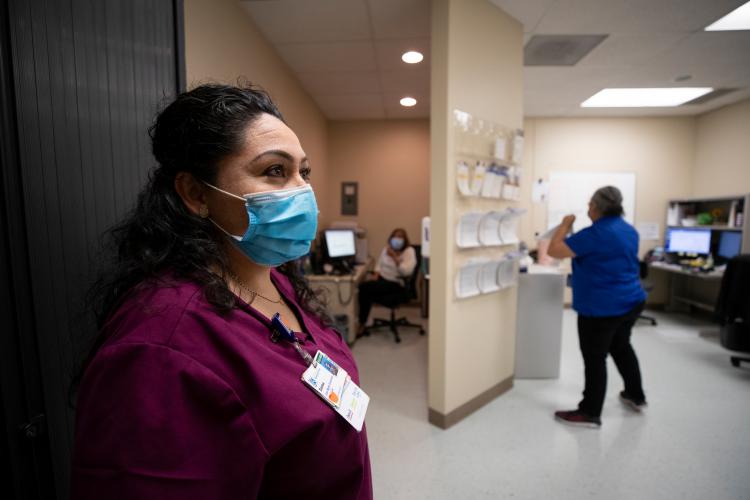
Certified Medical Assistants (CMA) are often among the first faces patients see when they come to JPS Health Network. Still, much of the work they do to help people get the best care possible happens behind the scenes.
“On the surface, they do a lot of clerical work,” said Devon Armstrong, Director of Outpatient Care Management at JPS. “But there’s a lot more people might not see. They’re the backbone of our department because they do the things that have to be done to let us do our jobs to the best of our ability.”
In their role collecting and recording data from patients, medical assistants spend a lot of time with them. They develop a rapport and foster trust, making patients feel more like friends. It’s not unusual for patients to share information with their CMA they might find too personal or embarrassing to reveal when the nurse or doctor walks into the examination room.
“Many of our medical assistants are people from the community,” Armstrong said. “They know the people who live here and have a lot of things in common with them. In many cases, they speak Spanish, which provides people who speak Spanish as their first language a level of comfort they might not otherwise have.”
Egla Cornejo is a Medical Assistant at the Southeast Medical Home in Arlington. There, she keeps a close eye on her patients who seem like her family.
“I like to help people,” Cornejo explained of her passion for her job. “I guess the most rewarding part is just being there for them. When they come into the clinic, other than registration, you’re the first person they talk to. So you get to know them.”
"In many cases, we work with people over a long period of time and get to see their journey to wellness. It’s touching to be able to be a part of that.”
For a variety of reasons, Cornejo said patients tell her things that they don’t reveal to doctors and nurses. She tries to bridge the communication gap to make sure important things don’t go unnoticed.
“When they don’t have the money to pay for their medication, sometimes they’re embarrassed to tell the doctor what’s really going on. Or maybe they’re living in their car and they’re embarrassed about it. That can be an important thing for the doctor to know. Plus, when we know these things, we can try to connect them with additional help.”
Emma Mejia, who works at the clinic at South Campus in Arlington, says she has patients she’s developed relationships with over many years.
“I love my job because I can see that I am making a difference in people’s lives,” Mejia said. “In many cases, we work with people over a long period of time and get to see their journey to wellness. It’s touching to be able to be a part of that.”
Besides serving as a line of communication for patients, CMAs also often serve as a lifeline to the resources people need. Mejia said she often works to help find transportation for people who don’t have a ride, vouchers for people who need food or medicine and
connections for people in need of shelter or counseling.
Both Cornejo and Mejia serve as case management coordinators because of their experience, skill and compassion as CMAs. They both hope to advance their ability to help patients by becoming social workers, and the both said they couldn’t imagine working anyplace besides JPS.
“Knowing that I am going to be there to help someone in need is rewarding to me,” Cornejo said. “We have a lot of patients at JPS who need our help. So this is the place for me to be.”
